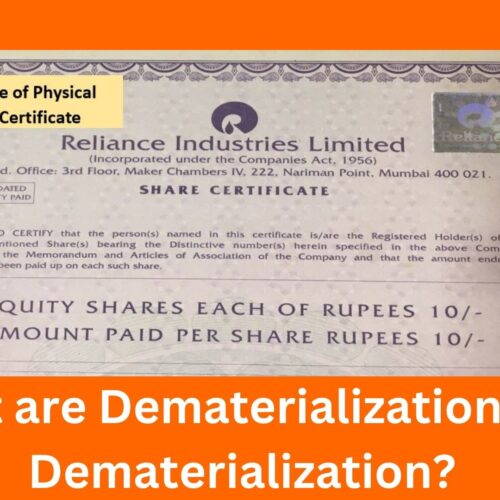What is a Demat Account?
Over the last few years, you may have heard the term “Demat account” a lot. If you’re wondering what a Demat account is, let me explain.
A Demat account is a bit like a bank account for the electronic storage of stocks and other securities. Demat Account, short for Dematerialization Account, is the process of holding investments such as stocks, bonds, government securities, mutual funds, insurance, and ETFs by eliminating the hassle of physically handling and maintaining paper stocks and related documents.
Let’s use an example to understand the meaning of the Demat account. Let’s say you want to buy stock in ABC company. If you purchase these shares, they must be transferred in your name. In the past, the stock exchange issued physical stock certificates with your name on them. As you can imagine, this required a ton of paperwork. A certificate had to be produced for each stock trade. To eliminate this paperwork, India introduced the Demat account system for trading on the NSE (National Stock Exchange) in 1996.
Now there is no paperwork and no physical certificates are issued. Therefore, when you buy ABC Company stock, you only get an electronic record in your Demat account. So, this is the Demat account.
Currently, a Demat account is mandatory if you want to trade/invest in the stock market (NSE & BSE) or any other securities. A Demat account number is mandatory for transactions and electronic settlement of transactions.
Table of Contents
- Importance of Demat Account
- How does a Demat Account Work?
- Demat Account vs Trading Account
- Documents Required For Demat Account Opening
- Types of Demat Accounts
- Features of Demat Accounts
- Benefits of a Demat Account
- Tips To Choose the Best Demat Account For You
- Further Readings: Related articles
- FAQs: Frequently Asked Questions
Importance of Demat Account
Demat accounts allow you to invest in a variety of investments including stocks, mutual funds, bonds, government securities, and exchange-traded funds (ETFs). Similar to a bank account, a Demat account is credited or debited each time you buy or sell company stock.
Not only does it eliminate unnecessary paperwork, but it also helps streamline your stock trading process. All Demat accounts in India are managed by two depositories, National Securities Depository Limited (NSDL) & Central Depository Services Limited (CDSL).
How does a Demat Account Work?
A Demat account is comparable in nature to a savings account. Just as cash can be deposited electronically into a savings account, an investor can deposit securities into a depository participant (DP) Demat account linked to an NSDL or CDSL. When you purchase stocks and securities, credits are created in your Demat account. However, when shares or securities are sold, they are debited from the account. For stocks and securities trading via a Demat account, it must be linked to trading and savings accounts.
Demat Account vs Trading Account
A Demat Account is typically followed with the aid of using a buying and selling account, which is required for purchasing and promoting stocks at the stock market. HDFC Bank, for example, has three in one Account that mixes a Savings Account, a Trading Account, and Demat Account.
Sometimes, people are getting confused between Demat and Trading Accounts. They aren’t the same. A Demat Account includes the info of the stocks and different securities in your name. To buy and promote stocks, you want to open a Trading Account. Many banks and agents provide Trading Accounts with online buying and selling facilities, which makes it less complicated for regular traders to take part withinside the stock market.
Documents Required For Demat Account Opening
To easily open a Demat account, you need some important documents. Below are the required documents.
Photo ID. – E.g., PAN Card, Aadhaar Card, Voter Card, Driver’s License, etc.
Bank Account Proof – Passbook or bank statement (not older than 3 months).
Proof of Income – Payslips or Taxes (mandatory in Currency & Derivatives segment).
Residence Proof – Driver’s License, Passport, Rent Agreement, Landline Telephone Bills, Electricity Bills, Gas Bills, etc.
Types of Demat Accounts
Demat accounts offered by Indian depository participants are mainly of three types.
Regular Demat Accounts
These are non-digitized accounts for Indian residents. If you are based in India and engaged in stock trading and investing then you must need a regular Demat account.
Repatriable Demat Accounts
This is one of two types of Demat accounts available to NRI. For NRIs, you can send money overseas using a repatriable account. This account must be linked to a non-resident external (NRE) bank account in order to repatriate funds to your home country.
Non-repatriable Demat Accounts
NRIs can also open non-repatriable accounts. International money transfers are not possible with this type of account. It must be linked to a Non-Resident Ordinary (NRO) bank account.
Features of Demat Accounts
Opening a Demat account gives you access to many useful features.
Transferring Share: All that is required to transfer shares is to send a duly signed Delivery Instructions Slip (DIS) to the depository participant.
Collateral of Loan: You can pledge securities in your Demat account and use them as collateral for loans from financial institutions.
Temporary Freeze: Demat Accounts can be temporarily blocked or freeze for a period of time. However, this feature is usually only available if you have a certain number of shares in your account.
Quick transfer of benefits: Best Demat account allows you to quickly transfer benefits such as dividends, stock bonus issues, stock splits, interest, and refunds.
E-facility: The NSDL allows you to electronically send instruction slips to depository participants (DP). This not only speeds up the whole process but also makes it less cumbersome.
Easy Holding: Managing physical certificates is cumbersome and dangerous. When you open a Demat account, your certificates are digitized for easier storage and increased security.
Multiple Access Points: Fully digitized Demat accounts can be accessed from anywhere using digital devices such as computers, mobile phones, and other smart devices.
Benefits of a Demat Account
A Demat account is not only an integral part of the stock market, but it also has several advantages.
- There is little or no risk associated with it
- Build confidence and increase investor confidence
- Increased transparency
- Quick & easy communication with investors
- Eliminate paperwork
- Easy settlements & Deliveries
Stock market purchases can only be made through a trading account and are later deposited in a Demat account. Therefore, to maximize the potential of your Demat account, it is essential to link it to your trading account.
Tips To Choose the Best Demat Account For You
Check if the account maintenance fee is reasonable!
There is an annual fee for maintaining a Demat account regardless of trading activity. So, check the Demat account fee range and choose the cheapest account.
Inquire About the Account Opening Process
The Demat account opening process offered by DP should be hassle-free and fast. Opening a Demat account involves a detailed process in accordance with SEBI guidelines. The depository account participants can simplify it with the help of e-KYC.
Looking for a seamless interface for brokerage and banking?
Depository participants also offer Demat accounts that serve exactly as trading accounts, enabling seamless transfers when buying or selling stocks and securities. The interface between the two accounts not only simplifies trading but also makes it economical.
Check if DP offers a customized analysis of Demat account balances.
Online analysis can be customized to your chosen stocks and securities and their investment habits to increase your returns. Such added value should be looked for when choosing the best Demat account.
In addition, features such as faster equity dematerialization turnaround time (TAT) allow us to assess the DP’s efforts in serving investors.
Further Readings: Related articles
Click on the below link to read relevant articles.
FAQs: Frequently Asked Questions
What is the use of a Demat account?
Demat Account, short for Dematerialization Account, simplifies the process of holding investments such as stocks, bonds, government securities, mutual funds, insurance, and ETFs, eliminating the hassle of physically handling and maintaining paper stocks and related documents.
Who needs a Demat account?
A Demat account number is required to settle transactions electronically. A Demat account allows you to buy stocks and keep them safe. This is similar to a bank account where you hold a deposit in a bank and a record of the debit/credit balance is kept in the bank’s passbook.
Is the Demat account a bank account?
A Demat account is comparable in nature to a savings account. Just as cash can be deposited electronically into a savings account, investors can deposit securities into a Depository Participant (DP) Demat account affiliated with the NSDL or CDSL.
Which bank is best for a Demat account?
Best Demat Accounts in India
- Axis Direct Demat Account
- SAS Online
- SBICAP Securities Demat Account
- ICICI Direct Demat Account
- Kotak Securities Demat Account
- HDFC Securities Demat Account
- Zerodha Demat Account
- Upstox Demat Account
Is the Demat account free?
Generally, there is no charge for Demat basic accounts with balances up to Rs. 50,000. Holders worth Rs. 50,001-2 lakhs will have to pay between Rs 100 to Rs 750 depending on the number of trades you make.
What is the minimum balance for the Demat account?
Demat Accounts do not require a “minimum balance” in stocks or securities. You can also link multiple Demat accounts to one PAN. But not with the same DP.
Do I need Demat for SIP?
So, the short answer to this question is no. You do not need a Demat trading account to invest in SIP. With significant advances in technology, you no longer need to have a Demat account to start investing in SIP. You only need a Demat account if you want to invest in the stock market.



